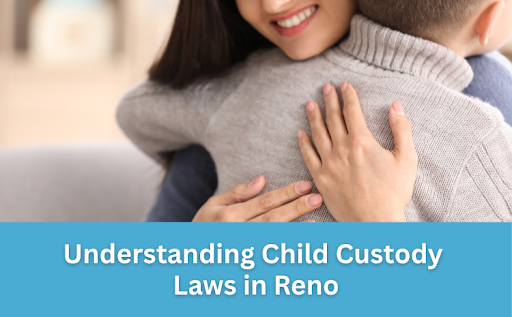
Child Custody in Reno: The Big Picture
Nevada custody decisions turn on one core idea: the best interests of the child—not automatic preferences for either parent. Courts evaluate safety, stability, and each parent’s ability to support the child’s relationship with the other parent. Nevada’s “best interests” statute also builds in important presumptions related to domestic violence and abduction, which can affect custody outcomes.
Types of Custody in Nevada
Legal Custody
Legal custody is about major decisions (health care, education, religion, and big life choices). Nevada law creates a presumption for joint legal custody when parents agree in writing or in open court, or when a parent has established—or tried to establish—a meaningful relationship with the child.
Physical Custody
Physical custody is where the child lives and the day-to-day schedule. Nevada recognizes joint physical custody and primary physical custody. As a practical guideline, Nevada case law treats 40% or more of overnights with each parent as joint physical custody; below that, one parent typically has primary. (The 40% benchmark comes from the Nevada Supreme Court’s Rivero framework, later applied by the Court in Bluestein.
Before There’s a Court Order
If no judge has ruled yet, each parent has joint legal and joint physical custody by default, regardless of marital status. This default remains until a court enters an order.
How Nevada Courts Decide: The “Best Interests” Test
By statute, the sole consideration for physical custody is the child’s best interests. Judges weigh factors such as:
- The child’s physical, developmental, and emotional needs
- The strength of the child’s relationship with each parent and siblings
- The level of parental conflict and each parent’s willingness to foster a positive relationship with the other parent
- The child’s preference (when of sufficient age and capacity)
- Any history of abuse, neglect, domestic violence, or abduction (with rebuttable presumptions against placing custody with a perpetrator)
Parenting Plans & Schedules (What Works in Reno)
Courts favor clear, written parenting plans that:
- Spell out the school-year, holiday, break, and summer schedules
- Address transportation, exchange locations/times, communication rules, and how to handle travel
- Include decision-making protocols and a dispute-resolution clause (e.g., mediation before filing motions)
Common Reno-area patterns (illustrative only):
- 2-2-3 or 2-2-5-5 for younger kids when parents live near the same school
- Week-on/week-off for older children with stable routines
- Primary + midweek dinner/overnight + alternating weekends when logistics or distance make equal time impractical
(Your plan should be tailored to school locations, extracurriculars, special needs, and work schedules.)
Mediation in Washoe County (Second Judicial District Court)
In many cases, Washoe County’s Family Services – Mediation program helps parents reach child-focused parenting plans outside the courtroom. It’s confidential and can be ordered by the court. Details and contact information are maintained on the Second Judicial District Court website. washoecourts.com
Relocation: Moving with a Child
Relocation is a frequent flashpoint. Nevada’s rules depend on the existing custody arrangement:
- If one parent has primary physical custody: that parent must obtain written consent from the other parent or permission from the court before relocating in a way that would substantially impair the other parent’s relationship (including out-of-state moves).
- If parents share joint physical custody: the relocating parent must first seek written consent; if denied, they must petition for primary physical custody for purposes of relocation.
In any relocation case, the moving parent carries the burden to show the relocation is in the child’s best interests—courts consider good-faith reasons, educational and family opportunities, logistics, and the feasibility of preserving the other parent’s relationship.
Jurisdiction Basics (UCCJEA): Which State’s Court?
Before a Nevada court can issue or modify custody orders, it must have jurisdiction under the UCCJEA. Generally, Nevada is the proper forum if it’s the child’s “home state” (where the child lived with a parent for 6 consecutive months before filing). There are exceptions—such as temporary emergency jurisdiction when safety is at issue.
Temporary Orders, Evaluations & Evidence
- Temporary custody orders can set a schedule while your case is pending.
- Evaluations (e.g., custody/parenting evaluations, substance testing) may be ordered if allegations affect safety or parenting capacity.
- Evidence that helps: school and medical records, messages about exchanges/decision-making, calendars of time with the child, witness statements, proof of involvement (activities, homework, appointments), and any documentation related to abuse or neglect concerns.
Modifying an Existing Custody Order
To modify custody, the requesting parent typically must show:
- a substantial change in circumstances affecting the child’s welfare, and
- that the proposed change is in the child’s best interests. Washoe County provides self-help resources and filing information, but experienced counsel can help you frame the evidence and avoid procedural missteps. selfhelp.nvcourts.gov
FAQs: Reno Child Custody
Is Nevada a “joint custody” state?
Nevada policy supports shared parenting where appropriate. Parents start with joint legal and physical custody before any order, courts often favor joint legal custody, and joint physical custody is generally recognized when each parent has about 40%+ of overnights—always subject to the child’s best interests. Justia+2Justia+2
Can the court consider a child’s preference?
Yes—if the child is of sufficient age and maturity, the judge may weigh the child’s wishes alongside all other best-interest factors. Justia
Do I need permission to move with my child?
Usually, yes. Primary custodians need consent or a court order; with joint physical custody, a parent must seek consent and, if denied, petition for primary custody to relocate. Get legal advice before you move. Justia+1
What if there’s domestic violence?
There are rebuttable presumptions against awarding joint or sole custody to a perpetrator of domestic violence. Courts must ensure any orders protect the child and the non-abusive parent. Justia
Your Next Step: Talk to a Reno Child Custody Lawyer
Custody cases are high-stakes and highly local. Anderson Keuscher PLLC crafts child-centered strategies aligned with Nevada law and Washoe County practice—from initial orders to relocations and modifications.
Call our Reno office or request a consultation to protect your parenting time and your child’s well-being.
